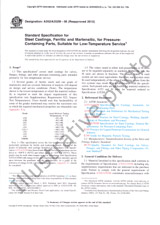We need your consent to use the individual data so that you can see information about your interests, among other things. Click "OK" to give your consent.
ASTM D746-20
Standard Test Method for Brittleness Temperature of Plastics and Elastomers by Impact
Translate name
STANDARD published on 1.6.2020
The information about the standard:
Designation standards: ASTM D746-20
Note: WITHDRAWN
Publication date standards: 1.6.2020
SKU: NS-1000008
The number of pages: 7
Approximate weight : 21 g (0.05 lbs)
Country: American technical standard
Category: Technical standards ASTM
The category - similar standards:
Annotation of standard text ASTM D746-20 :
Keywords:
brittle failure, brittleness temperature, elastomer, impact plastics,, ICS Number Code 83.060 (Rubber),83.080.01 (Plastics in general)
Additional information
| Significance and Use | ||||||||||||||||||||||
|
5.1 This test method establishes the temperature at which 50 % of the specimens tested would probably fail when subjected to the conditions specified herein. The test provides for the evaluation of long-time effects such as crystallization, or those effects that are introduced by low-temperature incompatibility of plasticizers in the material under test. Plastics and elastomers are used in many applications requiring low-temperature flexing with or without impact. Use data obtained by this method to predict the behavior of plastic and elastomeric materials at low temperatures only in applications in which the conditions of deformation are similar to those specified in this test method. This test method has been found useful for specification purposes, but does not necessarily measure the lowest temperature at which the material is suitable for use. FIG. 1 Dimensional Requirements Between Specimen Clamp and Striking Edge (Type A) FIG. 2 Typical Clamp (Type A) FIG. 3 Dimensional Details of Striking Edge and Clamping Device, Type B (Positioning of Unnotched Test Specimen) Note 1: Dimensions are in millimetres.
FIG. 4 Assembled Clamp with Test Specimens, Type B |
||||||||||||||||||||||
| 1. Scope | ||||||||||||||||||||||
|
1.1 This test method covers the determination of the temperature at which plastics and elastomers (as defined by Terminology D883) exhibit brittle failure under specified impact conditions. Two routine inspection and acceptance procedures are also provided. Note 1: When testing rubbers for impact brittleness use Test
Method D2137. When testing
plastic sheeting for impact brittleness, use Test Method
D1790.
1.2 The values stated in SI units are to be regarded as the standard. 1.3 Due to the potential safety and environmental hazards associated with mercury-filled thermometers, the use of alternative temperature measuring devices (such as thermocouples and RTDs) is encouraged. Warning—Mercury has been designated by many regulatory agencies as a hazardous material that can cause serious medical issues. Mercury, or its vapor, has been demonstrated to be hazardous to health and corrosive to materials. Caution should be taken when handling mercury and mercury containing products. See the applicable product Safety Data Sheet (SDS) for additional information. Users should be aware that selling mercury and/or mercury containing products into your state or country may be prohibited by law. 1.4 This standard does not purport to address all of the safety concerns, if any, associated with its use. It is the responsibility of the user of this standard to establish appropriate safety, health, and environmental practices and determine the applicability of regulatory limitations prior to use. Note 2: This test method and ISO 974 address the same subject
matter, but differ in technical content.
1.5 This international standard was developed in accordance with internationally recognized principles on standardization established in the Decision on Principles for the Development of International Standards, Guides and Recommendations issued by the World Trade Organization Technical Barriers to Trade (TBT) Committee. |
||||||||||||||||||||||
| 2. Referenced Documents | ||||||||||||||||||||||
|
We recommend:
Technical standards updating
Do you want to make sure you use only the valid technical standards?
We can offer you a solution which will provide you a monthly overview concerning the updating of standards which you use.
Would you like to know more? Look at this page.




 Cookies
Cookies
